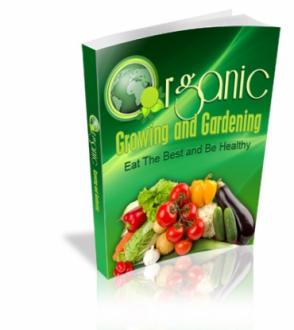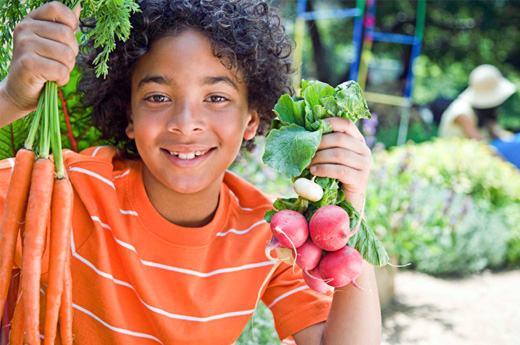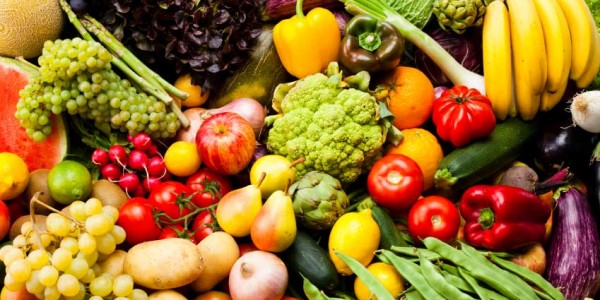The Organic Express
You may not be the kind of person who likes to jump aboard trendy bandwagons, and I can’t blame you for that, but going organic is one train you should definitely get on. This isn’t just a fad–organic food is a healthy way of life, and it can only benefit you. The best place to start is where your fruits and veggies come from: the earth. And since it’s the start of spring, what a perfect time to learn what natural gardening can do for you!
Lets start with your health. When you garden naturally, your produce is free from toxic chemicals. That chemical residue found on store bought fruits and veggies, if not washed thoroughly, enters your body. These chemicals are linked to an array of diseases and health issues: breast and prostate cancer, brain function, birth defects, miscarriages, and infertility, autism, depression, and the list goes on and on.
Then there’s money. If you ever went to purchase anything organic from the store, you probably winced at the price tag. Healthy eating is costly…unless, of course, you grow it yourself…Organic produce can cost you up to 50% more than regular produce. By organic gardening, you’ll not only eat better; you’ll save major moola, too.
And last but certainly not least, it benefits the environment. Organic gardeners use no chemical pesticides, herbicides, or fertilizers. Therefore, there’s no run-off into the water supply, which effects animals, birds, and bugs (as much as we hate the little pests, less than 2% of insects are harmful to gardens, most are beneficial).
Get Your Free E-Book!

Are You Burning A Hole In Your Pocket Buying Organic Food? Have You Been Wanting To Grow Your Own Organic Food, But Don’t Know Where To Begin? Would You Like A Healthy Lifestyle And Also Experience The Joy Of Walking Into Your Lush Garden?
Learn these simple growing and gardening tips and enjoy the benefits of your own organic food!
![]() We value your privacy and would never spam you
We value your privacy and would never spam you
Where Do I Began?
Maybe the word organic frightens you? Maybe you think it will be some big complicated thing to garden naturally. Lets break down the basics.
Organic Gardening 101
- Choose a site for your organic garden. Start small.
- Make a compost pile. According to Good Housekeeping, the best compost forms from the right ratio of nitrogen and carbon-rich organic wast, mixed with soil, water, and air.
- Add the right soil. Good, healthy soil helps build strong, productive plants. The best way to gauge the quality of soil is to test it ( you can do so with a home testing kit). Healthy soil leads to healthy plants, and healthy plants withstand disease and damage from insects.
- Control weeds. Use newspapers as weed barriers when creating a new bed (except colored ads and pages).
- Allow birds, worms, and beneficial insects. (Beneficial bugs: ladybugs, flies, aphid parasites, beetles, wasps, lacewings, etc.)

10 Tips For Your Natural Garden
- Organic fertilizers feed your plants while building the soil so it holds more moisture and nutrients, and promotes healthier plant root development. It’s much safer than chemicals, not to mention, chemicals in the soil loses organic matter and microbiotic activity, which leads the soil structure to deteriorate, and becomes less able to hold water and nutrients. The toxins in the chemicals also gets into your drinking water. Do not fertilize in the fall or winter.
- Make compost ‘tea’. Mix equal parts compost and water, then let it brew. For smaller seedlings, dilute this to 4 parts water and 1 part compost. This will become a nutrient-rich liquid for you to use for watering your plants and garden.
- Caffeine’s a natural herbicide. Tea and coffee are great for compost when used sparingly.
- Water your garden in the early morning or dusk. Watering at the hottest peak of the day actually increases evaporation and water loss.
- Fertilize before a rain whenever possible.
- Transplant seedling to larger containers after they’ve grown into 2 pairs of leaves.
- Before you decide upon plants for your yard, it’s important to analyze your specific soil, sunlight, and climate–then choose your plants.
- Cinnamon is a natural fungicide. You can mix it in your soil when planting seeds.
- Blue hydrangeas can turn pink in alkaline soil, and pink/red hydrangeas turn blue/purple in acid soils; you can manipulate the color with the soil’s pH.
- Mildew can be controlled by diluting 1 part milk in 9 parts water and spraying on your plants.









